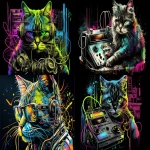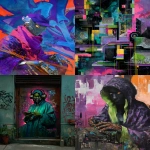Explore the Best AI Image Gallery

Blockchain: Reshaping Finance and the Creative Industry
Blockchain technology, renowned for its decentralized and secure nature, has rapidly transitioned from a niche concept to a transformative force across various sectors. Its impact on finance is undeniable, revolutionizing traditional systems with enhanced transparency, efficiency, and security. However, blockchains influence extends far beyond the realm of finance, reaching into the creative industry in profound ways.
Blockchains Impact on Finance
The financial landscape is undergoing a seismic shift due to blockchains disruptive capabilities. Here are some key areas where blockchain is making its mark:
- Decentralized Finance (DeFi): Blockchain enables the creation of decentralized financial applications, offering alternatives to traditional banking services such as lending, borrowing, and trading.
- Cryptocurrencies: Bitcoin, Ethereum, and other cryptocurrencies utilize blockchain for secure and transparent transactions, challenging conventional monetary systems.
- Smart Contracts: Self-executing contracts on the blockchain automate agreements and reduce the need for intermediaries, fostering trust and efficiency in financial transactions.
- Improved Security: Blockchains immutability and cryptographic security enhance data protection and prevent fraud, making it a more secure platform for financial operations.
Blockchain in the Creative Industry
The intersection of blockchain and the creative industry presents exciting opportunities for artists, musicians, writers, and other creators. Blockchain empowers them to:
- Own Their Intellectual Property: Blockchain provides a verifiable record of ownership and provenance for digital assets, protecting artists rights and ensuring fair compensation.
- Directly Connect with Fans: Creators can use blockchain-based platforms to connect with their audiences, build communities, and sell their work directly without intermediaries.
- Monetize Creative Content: Blockchain enables new models for monetizing creative content through NFTs (non-fungible tokens), which represent unique digital assets and can be traded on marketplaces.
- Support Transparency and Authenticity: Blockchain ensures the authenticity of artworks and collectibles, combating counterfeiting and providing verifiable evidence of origin.
Ethical Considerations
While blockchain offers immense potential, it also raises ethical considerations that need careful attention:
- Data Privacy: Blockchains transparent nature can raise concerns about data privacy and the potential for misuse of personal information.
- Accessibility and Inclusivity: Ensuring equitable access to blockchain technology and its benefits across diverse communities is crucial.
- Environmental Impact: Some blockchain networks consume significant energy, raising environmental concerns that require mitigation strategies.
- Regulation and Governance: Establishing clear regulatory frameworks for blockchain applications is essential for responsible innovation and consumer protection.
Future Trends
The future of blockchain in finance and the creative industry is brimming with possibilities:
- Hyperledger Fabric and Enterprise Blockchain: Increased adoption of enterprise-grade blockchain solutions for secure data sharing and collaboration.
- Decentralized Autonomous Organizations (DAOs): Blockchain-powered DAOs will enable decentralized governance and decision-making in creative industries and financial systems.
- Interoperability:** Seamless integration between different blockchain networks will foster wider adoption and unlock new use cases.
- Tokenization of Real-World Assets: Blockchain will facilitate the tokenization of assets like real estate, intellectual property, and securities, enhancing liquidity and access.
Blockchain technology is poised to revolutionize finance and the creative industry in profound ways. By embracing its potential while addressing ethical considerations, we can unlock a future of greater transparency, efficiency, and inclusivity in both realms.




](https://images.ai-img.art/thumbnails/150/1aa8215ea9a4f6970e81a10bdb4feb3b08d5e1a202c3c7ed2c9380f2f63d5a74.webp)






](https://images.ai-img.art/thumbnails/150/33d5e6d1da2b8ec2c4b8eab20d051c27c26d7a4991a77faf06fd03e96617fb1e.webp)




](https://images.ai-img.art/thumbnails/150/664a559b73eaff070d6f7fc7b3b151718aef9fa3a3f12f90b3c9092ceaa3cb56.webp)
































